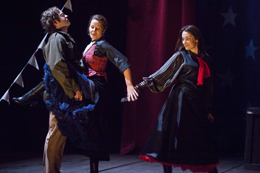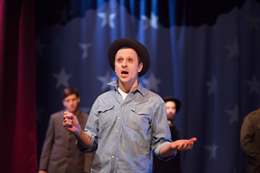An intelligent choice for the assassination anniversary that’s in it, Assassins the musical is, itself, fairly bizarre. Its scattershot moments of brilliance, despite its impressive and energetic production at the hands of the cast and crew, are not sufficient to make its garbled concept hold together, in the main because its frame is not clear. Is it political? Is it a playful vaudevillian take on the shocking number of attacks on the American head of state? Is it a merry jaunt through a century of American musical styles? Is it a kind of skewed shadow of It’s A Wonderful Life, in which the actions of one man are vital to everyone else involved? Every time a shot rings out, a disgruntled citizen gets his notoriety?
 The playful vaudevillian aspect presents us with the show at its best. Zia Holly’s set is appropriately music hall in character, and the sweeping curtains, the use of packing crates as the few set pieces, and the bare boards of the stage are properly evocative of a time and place, when current events were re-crafted for the masses via song and dance. This setting makes the most sense for the story John Wilkes Booth, the Ur-assassin who so famously shot Abraham Lincoln in Ford’s Theatre. It is his role as Virgil to the various Dantes, from Charles Guiteau (James Garfield) in 1881 to John Hinckley (Ronald Reagan) in 1981 that is the through-line over one hundred years of acts of violence; once we leave that particular narrative device behind, things start to get ropey. The chorus comprised of Siobhan Cullen, Peter Corboy, Matthew Malone, Liam McCarthy and Ciara Smyth are soon quickly missed, as we are taken through the lives of each assassin — and to be precise, not all of them were actually successful, so do they merit the term? — and each gets his or her own moment under the spotlight.
The playful vaudevillian aspect presents us with the show at its best. Zia Holly’s set is appropriately music hall in character, and the sweeping curtains, the use of packing crates as the few set pieces, and the bare boards of the stage are properly evocative of a time and place, when current events were re-crafted for the masses via song and dance. This setting makes the most sense for the story John Wilkes Booth, the Ur-assassin who so famously shot Abraham Lincoln in Ford’s Theatre. It is his role as Virgil to the various Dantes, from Charles Guiteau (James Garfield) in 1881 to John Hinckley (Ronald Reagan) in 1981 that is the through-line over one hundred years of acts of violence; once we leave that particular narrative device behind, things start to get ropey. The chorus comprised of Siobhan Cullen, Peter Corboy, Matthew Malone, Liam McCarthy and Ciara Smyth are soon quickly missed, as we are taken through the lives of each assassin — and to be precise, not all of them were actually successful, so do they merit the term? — and each gets his or her own moment under the spotlight.
We learn about the earlier assassins, as obscure in modern consciousness as the presidents they aimed for (James Garfield, I ask you.) The girl-talk moments between Lynette ‘Squeaky’ Fromme and Sara Jane Moore (failed attempt on Gerald Ford) are highly entertaining, and all the shooters mix and match throughout the piece, which allows us some insight into their motives. The overriding conclusion is that there’s a fourth inalienable right one can enjoy as an American: life, liberty and the pursuit of happiness not in your grasp? You are absolutely entitled to take a pot shot at POTUS. You can become eternally famous if you become known as someone who had the guts to take down The Man. You, too, can make up for all that parental neglect, for all the pain created from all the girls who didn’t like you, for those thwarted ambitions, for all the loneliness. That very last might have made a case for pathos, but things move so quickly, we’re never really given the chance to truly know who all these people are, and why they did what they did.
 Raymond Scannell takes over some of the continuity duties from Booth in his role of The Balladeer, a character who is only employed occasionally, without much rhyme or reason. He doubles as Lee Harvey Oswald in what is the most moving, emotional set piece of the show, and it’s here we’re presented with the thesis that the spectres or essences of all the killers who have come before him and have yet to come, egg him on to shoot Kennedy from the window of the schoolbook depository. Without Oswald, no one would care about Garfield's assassin; without Oswald, Hinckley has no role model. Is this a comment on the sanity of Oswald? Did he hear voices? The entire project is a fantasy, it’s true, and yet we never seem to be fully invested in it as such — that’s why it’s a shame that the variety show aspect of the beginning was done away with: as facetious as it was, it was entertaining, and seemed to have located its politics in old-fashioned satirical revue. This added a contrast to the rather volatile subject matter, and as a frame, made some sort of sense: if we’re not going to pussy-foot around this topic, we may as well go for it with rousing numbers and cheeky lyrics.
Raymond Scannell takes over some of the continuity duties from Booth in his role of The Balladeer, a character who is only employed occasionally, without much rhyme or reason. He doubles as Lee Harvey Oswald in what is the most moving, emotional set piece of the show, and it’s here we’re presented with the thesis that the spectres or essences of all the killers who have come before him and have yet to come, egg him on to shoot Kennedy from the window of the schoolbook depository. Without Oswald, no one would care about Garfield's assassin; without Oswald, Hinckley has no role model. Is this a comment on the sanity of Oswald? Did he hear voices? The entire project is a fantasy, it’s true, and yet we never seem to be fully invested in it as such — that’s why it’s a shame that the variety show aspect of the beginning was done away with: as facetious as it was, it was entertaining, and seemed to have located its politics in old-fashioned satirical revue. This added a contrast to the rather volatile subject matter, and as a frame, made some sort of sense: if we’re not going to pussy-foot around this topic, we may as well go for it with rousing numbers and cheeky lyrics.
.jpg.aspx%3Fwidth=260&height=173) All that said, Ronan Phelan has crafted a truly professional production, in tandem with musical director Danny Forde. The cast are universally adept and engaging, with stand out performances from Scannell, Shane O’Reilly as Booth, Clare Barrett as Sara Jane Moore, and with Paul Curley in particular, as Charles Guiteau, showing himself to be a true all-rounder. The range of eras as communicated through the costumes allowed Kate Moylan and Yvonne Carry to have a grand old time, and the attention to detail was delightful.
All that said, Ronan Phelan has crafted a truly professional production, in tandem with musical director Danny Forde. The cast are universally adept and engaging, with stand out performances from Scannell, Shane O’Reilly as Booth, Clare Barrett as Sara Jane Moore, and with Paul Curley in particular, as Charles Guiteau, showing himself to be a true all-rounder. The range of eras as communicated through the costumes allowed Kate Moylan and Yvonne Carry to have a grand old time, and the attention to detail was delightful.
It was so invigorating to see something of this high standard that the strangeness of the book can be overlooked: the cast as whole gave it such commitment and energy, and shows that Irish actors can indeed handle this sort of material. It makes one yearn for more, equally sophisticated, productions of musical theatre on our stages.
Susan Conley